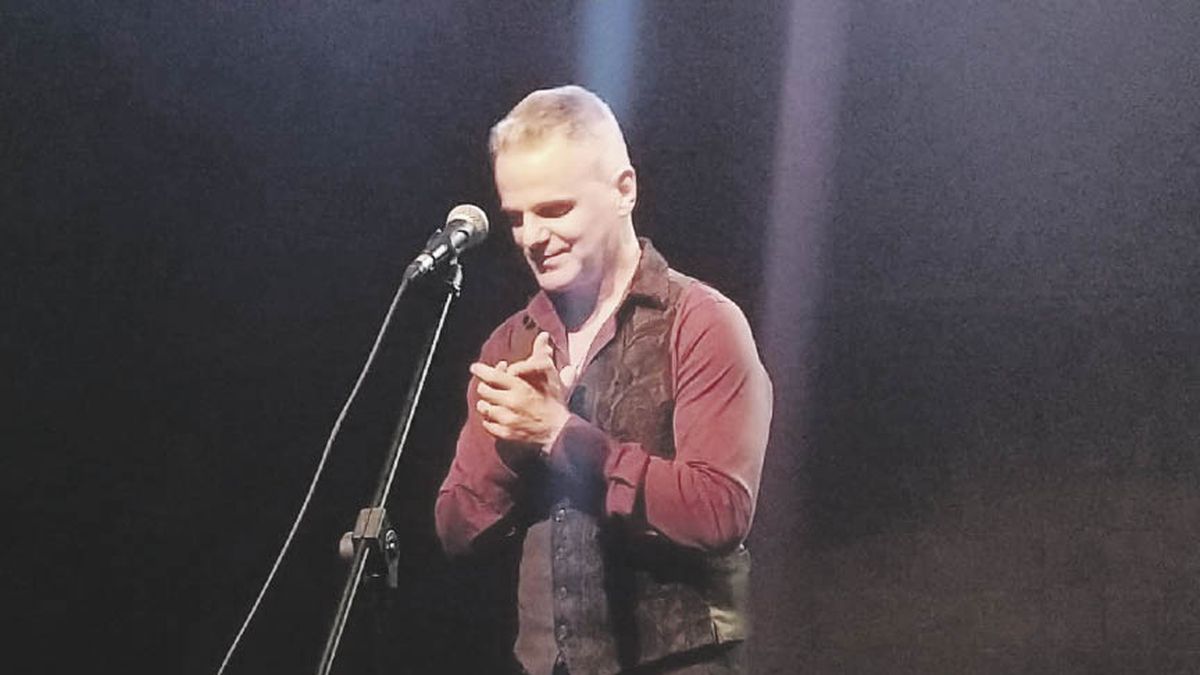this is love, whoever tried it knows it.”
The title of the show of poems and songs that Mariano Moro, actor, singer and writer from Mar del Plata (who shares his residence with Buenos Aires) has just performed comes from the final line of the last tercet of Lope de Vega’s sonnet, “Esto es amor”. premiere at El Ópalo (Junín 380), accompanied on piano by Francisco Huaricapcha, on Saturdays at 8 pm.
“I trained as an actor, and I always had a special relationship with poetry. To the point that, at first, I began to do theater in verse”, he tells this newspaper. “Then I stopped acting and just wrote and directed the plays. My passion has always been literature, and especially poetry, which for me is the purest form of literature and the root of all the arts”
In “This Is Love” Moro recites and sings works by authors as diverse as Francisco de Quevedo, Luis Rosales, Pedro Salinas, Charles Aznavour, Gerardo Diego, Joan Manuel Serrat, Sor Juana, anonymous Castilian romances, Ornella Vanoni and Luis Cernuda, to name just a few. We talk with him.
Journalist: How was the genesis of this show?
Mariano Moro: There was a precedent arising from two critical, bad circumstances that ended up prompting me to create it: the death of my mother, and the pandemic. So, locked up and sad, I began to “download” the intellectual of poetry to my body. When my mother was dying I went to Mar del Plata to accompany her, I spent her last days with her, and then I prepared my first show called “Lengua romance”: there I realized that, almost without meaning to, I had chosen poems and songs that in almost all cases had to do with death, which is one of the great themes of poetry.
Q.: From Jorge Manrique to here…
MM: Precisely, he recited Manrique’s Coplas, but there was an insistence on things by Borges, where he spoke of death, Miguel Hernández’s Elegy, also death. And it had not been my initial intention. That was my first experience. I only did it in Mar del Plata, where I also interpreted García Lorca’s Gypsy Ballads this summer, in its entirety… Death there is also a very strong thing. So, then, throughout the past year I have been preparing this show whose exclusive theme is love. I wanted the first time I did a recital of this nature in Buenos Aires to be about love.
Q.: And with what selection criteria, I imagine it must have been difficult to leave some things out, did you arrive at the final repertoire?
MM: Yes of course. It was difficult. It’s a mix. There are songs that have always accompanied me, even in the shower, and poems that I memorized since I was a child, but others have not. They are new pieces, the result of reading a lot and poetry more and more, and always with the radar of my perception oriented towards the themes of love.
P.: But also, in “Esto es amor”, there is a compensation, a musical balance between one piece and another; a strong poem followed by an adagio, for example.
MM: I thank you very much for that concept, because it was also one of the things I looked for. But there are no rules. It is an artist’s intuition, there is no guide to follow. I am attracted to the Spanish repertoire, the classic and the contemporary, but in the assembly I began to realize that it was necessary to break with that line at some point, go to another, and then return. Or how to incorporate the Argentine, which is so important. Well, once I had the entire repertoire, I started organizing it and here it is, “This is love”.
P.: The poets of today are mostly, let’s say it bluntly, supporters of free poetry, without rhyme, cerebral. Your path goes the other way, how is your relationship with that poetry?
MM: I’m not against it, I also read it. And I underline this: I read it. They are not poems that I can say in an auditorium to people who will only listen to them once and cannot read them again.
Q.: There were poets, historical now, who didn’t even think about the recitation. Apollinaire forced to “read” his Calligrammes as if they were drawings. The verses formed special schemes.
MM.: Exact. There is poetry that can only be read on paper, and perform those intellectual operations. Nothing was invented today. But that is not sustainable in a show. The same thing happens with modern art music. I can hear it, but at some point the body asks you for Mozart. I enjoy it, the public enjoys it, although that is in no way a manifesto against contemporary poetry. I feel the poetry that was composed so that they tell me, and say it. Whether from the Greeks, from the Spanish ballads, from the 19th century or from the modern ones.
P.: It also seemed representative to me, especially to value the musical, that you sing songs in French, in Italian, or that you recite a Shakespeare sonnet in English, risking that part of the audience does not understand it.
MM: I have a deep, almost religious love for our language, but when you go to other languages you notice even more that musical dimension that speech has, that the listener of his native language sometimes doesn’t even take into account. That is why, after singing or reciting a poem in another language, I love to return to Spanish because I feel that I make the musicality of our language more evident.
Source: Ambito
David William is a talented author who has made a name for himself in the world of writing. He is a professional author who writes on a wide range of topics, from general interest to opinion news. David is currently working as a writer at 24 hours worlds where he brings his unique perspective and in-depth research to his articles, making them both informative and engaging.




